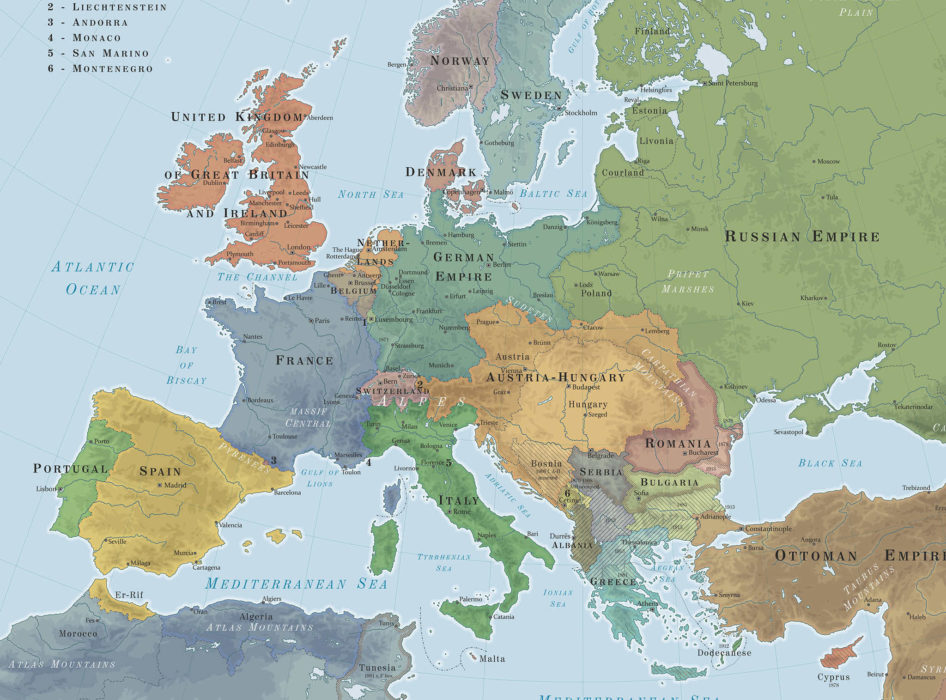THE CENTURY THAT STRETCHES between 1912 and today is the bloodiest in human history. Millions have been killed in wars, massacres and other acts of persecution, terror, violence and genocide. Brutality on an inconceivable scale has been variously justified in the name of nationalism, ideology, race, religion and class. One hundred years ago today, ‘Abdu’l-Bahá explained that all such excuses for bloodshed have no basis in reality.
“Man has set up imaginary lines,” he said, “only to have them become causes of strife. A river is made a boundary; one side is called France and the other Germany. What a superstition! An imaginary line to become a cause of bloodshed!”
On September 1, 1912, ‘Abdu’l-Bahá was speaking at the Unitarian “Church of the Messiah” in Montreal. The Rev. F. J. Griffin introduced him to the packed church. A journalist from the Montreal Star considered ‘Abdu’l-Bahá’s address on the causes of war to be “a powerful plea for peace and unity among the nations.” Despite the unusual sound and sight of a Persian speaker “in flowing robes,” the newspaper accounts did not dwell on the exoticism of the speaker’s appearance, but focused on the challenging content of his talk.
The true “reality” was the unity of all humans, said ‘Abdu’l-Bahá. Everyone “came from the same elements, all were descended from the same race and all had to live on the same globe.” Because “God created all mankind, maintained all and protected all,” there was “no difference in His bestowal of mercy among His children.”
“Before God,” stated ‘Abdu’l-Bahá, “all mankind is one. There is no Germany and no England, no Frenchman, no Turk and no Persian.” As he often did, ‘Abdu’l-Bahá compared animal and human behavior. He pointed out that a “dove or a sheep from the Orient would consort” with their counterparts in the Occident without prejudice. “Why could not men do likewise?”
‘Abdu’l-Bahá stated that the major religions “rebuked all things which brought about difference and discord.” Their message was always about “the goodness of God” and they worked “for the solidarity of the [human] race.” However, he noted, “imaginary differences” had been introduced to religious practice throughout history, and these had “nothing to do with the original teachings of the prophets,” leading to “strife and contention.”
War, explained ‘Abdu’l-Bahá, “became rampant” and men became “like beasts of prey engaged in each other’s murder, wiping out homes and laying waste each other’s country.” Through forgetfulness of the laws of God, ‘Abdu’l-Bahá told his audience, people have “allowed themselves to be governed by racial and religious prejudice, or patriotic and political bias.” The Star reported ‘Abdu’l-Bahá’s reference to the teachings of his father, Bahá’u’lláh, who had said:

“If war arose from religion, then no religion was better; if a remedy produced sickness, then it was better to have no remedy. When religion became a cause of warfare and bloodshed, it was worthless and it was a thousand times better to have none of it.”
‘Abdu’l-Bahá’s critique of “imaginary lines” extends beyond national borders and religious denominations. He challenged his listeners to examine all social constructions, cultural norms and categories of identity that led to conflict and disunity. As an example, he mentioned need for “the equality of the sexes in everything, political and social.” These challenges to nationalism, religion and gender roles in 1912 captivated his listeners. He called upon them to re-examine the “imaginary lines” they lived by.
“All this enmity and discord is the fruit of ignorance and a lack of mutual understanding,” he said. “Get instruction, so that all this may be banished. Drive all this away so that all mankind may become united.’’ ‘Abdu’l-Bahá encouraged his first Canadian public audience, “the people of this young and noble nation,” to “assist in the great movement for the peace and unity of the world.”






